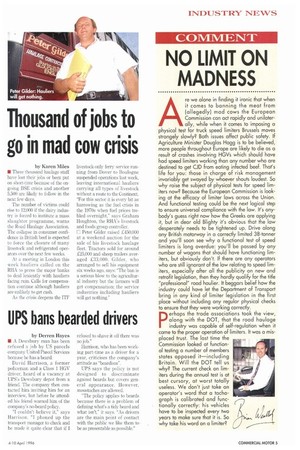NO LIMIT ON MADNESS
Page 7

If you've noticed an error in this article please click here to report it so we can fix it.
re we alone in finding it ironic that when it comes to banning the meat from (allegedly) mad cows the European Commission can act rapidly and unilaterally, while when it comes to imposing a physical test for truck speed limiters Brussels moves strangely slowly? Both issues affect public safety, If Agriculture Minister Douglas Hogg is to be believed, more people throughout Europe are likely to die as a result of crashes involving HGVs which should have had speed limiters working than any number who are destined to get CJD from eating infected beef. That's life for you: those in charge of risk management invariably get swayed by whoever shouts loudest. So why raise the subject of physical tests for speed limiters now? Because the European Commission is looking at the efficacy of limiter laws across the Union. And functional testing could be the next logical step to ensure universal compliance with the law. It's anybody's guess right now how the Greeks are applying it, but in dear old Blighty it's obvious that the law desperately needs to be tightened up. Drive along any British motorway in a correctly limited 38-tonner and you'll soon see why a functional test of speed limiters is long overdue: you'll be passed by any number of wagons that should have functioning limiters, but obviously don't. If there are any operators who are still ignorant of the law relating to speed limiters, especially after all the publicity on new and retrofit legislation, then they hardly qualify for the title //professional" road haulier. It beggars belief how the industry could have let the Department of Transport bring in any kind of limiter legislation in the first place without including any regular physical checks to ensure that they were working correctly. perhaps the trade associations took the view, along with the DOT, that the road haulage industry was capable of self-regulation when it came to the proper operation of limiters. It was a mis placed trust. The last time the Commission looked at function al testing a number of members states opposed it—including Britain. Will the DOT tell us why? The current check on lim iters during the annual test is at best cursory, at worst totally useless. We don't just take an operator's word that a tachograph is calibrated and func tionally correctly: his vehicles have to be inspected every two years to make sure that it is. So why take his word on a limiter?
















































































































